Fill Out a Valid Nj Contract Sale Template
In the realm of real estate transactions within New Jersey, the NJ Contract Sale form serves as a vital document that outlines the terms and conditions agreed upon by the seller and buyer for the sale of property without the involvement of a brokerage. This comprehensive contract ensures clarity and mutual understanding by detailing each aspect of the sale, from the identification and inclusion of the property to the agreement on the sale price and the disclosure of financial arrangements. Notably, it addresses the method of financing, whether through cash, new loans, assumed loans, or seller financing, and sets conditions for financing approval. Furthermore, it delves into earnest money deposits, the condition of the property, responsibilities for utilities, and specifies closing details, including date and allocated costs. The form protects both parties by stipulating procedures for property inspection, the handling of any casualty losses, and addressing situations of default. It also outlines the responsibilities for obtaining necessary appraisals, surveys, and termite inspections, ensuring that both seller and buyer are aware of and agree to the conditions affecting the property. Besides governing the transfer and conveyance of title, it implicitly reinforces the importance of legal recourse through representations and warranties, and the allocation of closing costs. Additionally, it underscores the significance of legality and fairness by specifying the handling of attorney's fees in legal proceedings related to the transaction. This form not only serves as a binding legal document but also as a guide to ensure a smooth transition of property ownership, making it an essential tool for parties involved in real estate transactions in New Jersey.
Sample - Nj Contract Sale Form
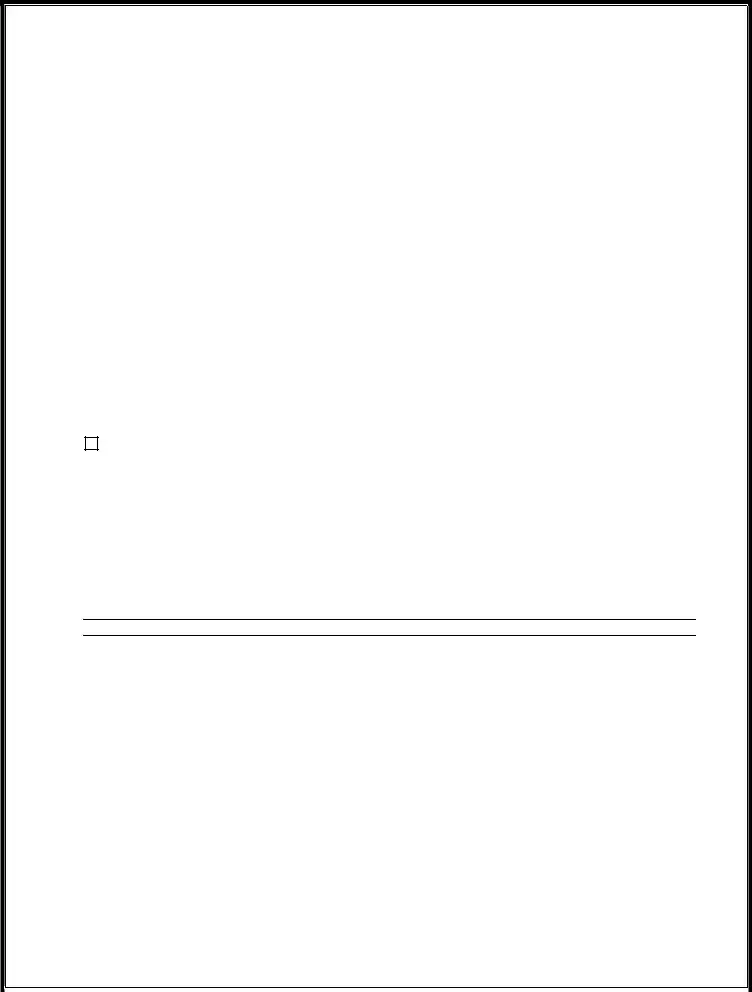
CONTRACT FOR THE SALE AND PURCHASE OF REAL ESTATE
(NO BROKER)
For good and valuable consideration, the receipt and sufficiency of which is hereby acknowledged,
|
|
|
|
|
|
,“Seller” whether one or more, and |
||||
|
|
|
|
|
|
,“Buyer” whether one or more, |
|
|||
|
do hereby covenant, contract and agree as follows: |
|
|
|
|
|
|
|||
1. |
AGREEMENT TO SALE AND PURCHASE: |
Seller agrees to sell, and Buyer agrees to buy from Seller the |
||||||||
|
property described as follows: (complete adequately to identify property) |
|
|
|
|
|||||
|
Address: |
|
|
|
|
|
|
|
||
|
Shown on the municipal tax map of |
|
County, New Jersey, as Lot |
, Block |
. |
|||||
|
|
|
|
|
|
|
|
|
|
|
|
Legal Description (or see attached exhibit): |
|
|
|
|
|
|
|||
|
|
|
|
|
|
|
|
|
|
|
|
|
|
|
|
|
|
|
|
|
|
As described in attached Exhibit.
Together with the following items, if any: (Strike items to be retained by Seller) curtains and rods, draperies and rods, valances, blinds, window shades, screens, shutters, awnings,
All property sold by this contract is called the "Property."
2.SALES PRICE: The parties agree to the following sales price:
|
Amount |
Amount |
|
Purchase Price |
$ |
|
|
Earnest Money |
|
$ |
$ |
New Loan |
|
$ |
$ |
Assumption of Loan |
|
$ |
|
Seller Financing |
|
$ |
|
Cash at Closing |
|
|
|
Total ( both columns should be equal) |
$ |
|
|
Both columns should be an equal amount. |
|
|
|
If the unpaid principal balance(s) of any assumed loan(s), if any, as of the Closing Date varies from the loan balance(s) stated above, the cash payable at closing will be adjusted by the amount of any variance.
3.FINANCING: The following provisions apply with respect to financing:
Buyer Initials ______ _______ |
- 1 - |
Seller Initials _______ _______ |
|
|
|
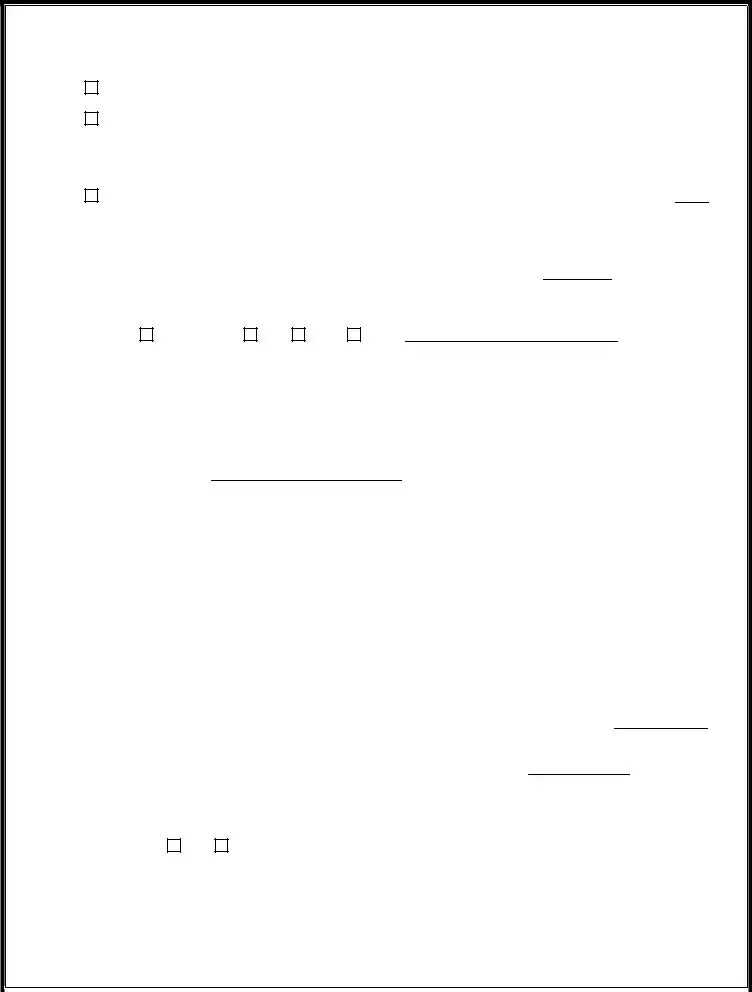
CASH SALE: This contract is not contingent on financing.
OWNER FINANCING: Seller agrees to finance |
|
|
|
|
dollars of the purchase price pursuant |
||||||||
to a promissory note from Buyer to Seller of $ |
|
, bearing |
|
|
% interest per annum, payable |
||||||||
|
|
|
|
|
|
|
|
|
|
|
|||
over a term of |
|
years with even monthly payments, secured by a deed of trust or mortgage lien |
|||||||||||
with the first payment to begin on the |
|
day of |
|
, 20 |
|
. |
|
||||||
|
|
|
|
|
|
|
|
|
|
|
|
|
|
NEW LOAN OR ASSUMPTION: This contract is contingent on Buyer obtaining financing. Within
days after the effective date of this contract Buyer shall apply for all financing or noteholder's approval of any assumption and make every reasonable effort to obtain financing or assumption approval. Financing or assumption approval will be deemed to have been obtained when the lender determines that Buyer has satisfied all of lender's financial requirements (those items relating to Buyer's net worth, income and
creditworthiness). If financing or assumption approval is not obtained within days after the effective date hereof, this contract will terminate and the earnest money will be refunded to Buyer. If Buyer intends to obtain a new loan, the loan will be of the following type:
Conventional
VA
FHA
Other:
The following provisions apply if a new loan is to be obtained:
FHA. It is expressly agreed that notwithstanding any other provisions of this contract, the Purchaser (Buyer) shall not be obligated to complete the purchase of the Property described herein or to incur any penalty by forfeiture of earnest money deposits or otherwise unless the Purchaser (Buyer) has been given in accordance with HUD/FHA or VA requirements a written statement by the Federal Housing Commissioner, Veterans Administration, or a Direct Endorsement lender setting forth the appraised value of the Property of
not less than $. The Purchaser (Buyer) shall have the privilege and option of proceeding with consummation of the contract without regard to the amount of the appraised valuation. The appraised valuation is arrived at to determine the maximum mortgage the Department of Housing and Urban Development will insure. HUD does not warrant the value nor the condition of the Property. The Purchaser (Buyer) should satisfy himself/herself that the price and condition of the Property are acceptable.
VA. If Buyer is to pay the purchase price by obtaining a new
Existing Loan Review. If an existing loan is not to be released at closing, Seller shall provide copies of the loan documents (including note, deed of trust or mortgage, modifications) to Buyer within
calendar days from acceptance of this contract. This contract is conditional upon Buyer's review and approval of the provisions of such loan documents. Buyer consents to the provisions of such loan
documents if no written objection is received by Seller from Buyer withincalendar days from Buyer's receipt of such documents. If the lender's approval of a transfer of the Property is required, this contract is conditional upon Buyer's obtaining such approval without change in the terms of such loan, except as may be agreed by Buyer. If lender's approval is not obtained on or before
|
|
|
, |
|
this contract shall be terminated on such date. The |
Seller |
shall |
hall not, be released from liability under such existing loan. If Seller is to be released and |
|||
release approval is not obtained, Seller may nevertheless elect to proceed to closing, or terminate this agreement in the sole discretion of Seller.
Credit Information. If Buyer is to pay all or part of the purchase price by executing a promissory note in
Buyer Initials ______ _______ |
- 2 - |
Seller Initials _______ _______ |
|
|
|
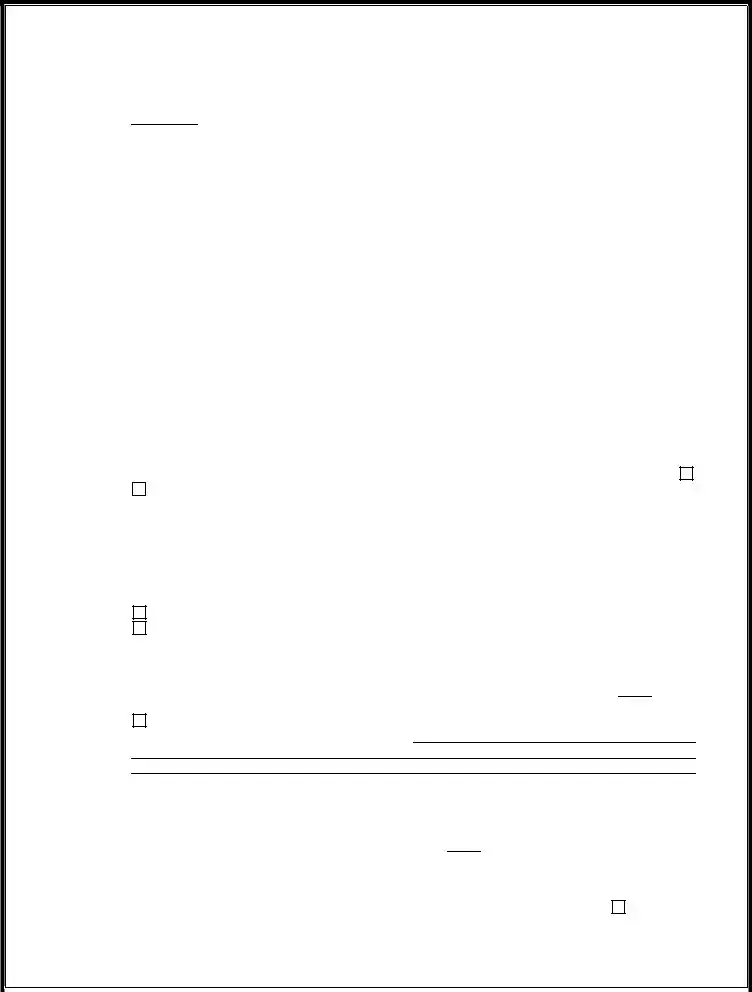
favor of Seller or if an existing loan is not to be released at closing, this contract is conditional upon Seller's approval of Buyer's financial ability and creditworthiness, which approval shall be at Seller's sole and
absolute discretion. In such case: (l) Buyer shall supply to Seller on or before |
|
, |
,at, Buyer's expense, information and documents concerning Buyer's financial, employment and credit condition; (2) Buyer consents that Seller may verify Buyer's financial ability and creditworthiness; (3) any such information and documents received by Seller shall be held by Seller in confidence, and not released to others except to protect Seller's interest in this transaction; (4) if Seller does
|
not provide written notice of Seller's disapproval to Buyer on or before |
, |
, |
|||||
|
then Seller waives this condition. |
|
|
|
|
|
|
|
4. |
EARNEST MONEY: Buyer shall deposit $ |
|
as earnest money with |
|
|
|
|
|
|
upon execution of this contract by both parties. |
|
|
|
|
|
|
|
5.PROPERTY CONDITION:
SELLER’S DISCLOSURE OF
Federal law for a residential dwelling constructed prior to 1978. An addendum providing such disclosure |
is |
|
attached |
is not applicable. |
|
Buyer hereby represents that he has personally inspected and examined the
Buyer accepts the property in its
Buyer may have the property inspected by persons of Buyer's choosing and at Buyer's expense. If the inspection report reveals defects in the property, Buyer shall notify Seller within 5 days of receipt of the report and may cancel this contract and receive a refund of earnest money, or close this agreement notwithstanding the defects, or Buyer and Seller may renegotiate this contract, in the
discretion of Seller. All inspections and notices to Seller shall be complete within days after execution of this agreement.
Buyer accepts the Property in its present condition; provided Seller, at Seller’s expense, shall complete the following repairs and treatment:
Buyer agrees that he will not hold Seller or its representatives responsible or liable for any present or future structural problems or damage to the foundation or slab of said property. If the subject residential dwelling was constructed prior to 1978, Buyer may conduct a risk assessment or inspection for the presence of
paint and/or
MECHANICAL EQUIPMENT AND BUILT IN APPLIANCES: All such equipment is sold
Buyer Initials ______ _______ |
- 3 - |
Seller Initials _______ _______ |
|
|
|

warranty, or |
shall be in good working order on the date of closing. Any repairs needed to mechanical equipment |
||||||||
or appliances, if any, shall be the responsibility of |
Seller Buyer. |
|
|
||||||
UTILITIES: Water is provided to the property by |
|
|
|
, Sewer is provided |
|||||
by |
|
. |
Gas is provided by |
. |
|||||
|
|
|
|
|
|
|
|
|
|
Electricity is provided by |
|
|
. |
|
|
|
|||
Other:
|
The present condition of all utilities is accepted by Buyer. |
|
|
|
|
|
|
|
||
6. |
CLOSING: The closing of the sale will be on or before |
|
, 20 |
|
|
, unless extended pursuant |
||||
|
to the terms hereof. |
|
|
|
|
|
|
|
||
|
Closing may be extended to within 7 days after objections to matters disclosed in the title abstract, certificate or |
|||||||||
|
Commitment or by the survey have been cured. |
|
|
|
|
|
|
|
||
|
If financing or assumption approval has been obtained, the Closing Date will be extended up to 15 days if necessary |
|||||||||
|
to comply with lender's closing requirements (for example, appraisal, survey, insurance policies, |
|||||||||
|
repairs, closing documents). If either party fails to close this sale by the Closing Date, the |
|||||||||
|
be entitled to exercise the remedies contained herein. The closing date may also be extended by written agreement of |
|||||||||
|
the parties. |
|
|
|
|
|
|
|
||
7. |
TITLE AND CONVEYANCE: Seller is to convey title to Buyer by Warranty Deed or |
|
|
|
(as |
|||||
|
appropriate) and provide Buyer with a Certificate of Title prepared by an attorney, title or abstract company upon |
|||||||||
|
whose Certificate or report title insurance may be obtained from a title insurance company qualified to do and doing |
|||||||||
|
business in the state of New Jersey. Seller will also execute a Bill of Sale, if necessary, for the transfer of any |
|||||||||
|
personal property. Seller shall, prior to or at closing, satisfy all outstanding mortgages, deeds of trust and special |
|||||||||
|
liens affecting the subject property which are not specifically assumed by Buyer herein. Title shall be good and |
|||||||||
|
marketable, subject only to (a) covenants, conditions and restrictions of record, (b) public, private utility easements |
|||||||||
|
and roads and |
|||||||||
|
(d) special and other assessments on the property, if any, (e) general taxes for the year |
|
|
and subsequent |
||||||
|
years and (e) other: |
|
|
|
|
|
. |
|||
The Buyer does not have to complete the purchase, however, if any easement, restriction or facts disclosed by an accurate survey would substantially interfere with the use of the Property for residential purposes.
A title report shall be provided to Buyer at least 5 days prior to closing. In the event Seller’s title shall contain any exceptions other than as set forth herein, Buyer shall notify Seller and Seller shall have 30 days within which to eliminate those exceptions. If Seller cannot remove those exceptions, Buyer shall have the option to void this Contract or to proceed with closing of title without any reduction in the purchase price. If Buyer elects to void this Contract, as provided in the preceding sentence, the deposit money shall be returned to Buyer and Seller shall reimburse Buyer for reasonable and ordinary search and survey expenses. Seller represents that the property may be legally used as zoned and that no government agency has served any notice to Seller requiring repairs, alterations or corrections of any existing condition except as stated herein.
8.APPRAISAL, SURVEY AND TERMITE INSPECTION: Any appraisal of the property shall be the responsibility
of

 Buyer
Buyer 
 Seller. A survey is:
Seller. A survey is: 
 not required
not required 
 required, the cost of which shall be paid by
required, the cost of which shall be paid by 
 Seller
Seller 
 Buyer. A termite inspection is
Buyer. A termite inspection is 
 not required
not required 
 required, the cost of which shall be paid by
required, the cost of which shall be paid by 
 Seller
Seller 
 Buyer. If a survey is required it shall be obtained within 5 days of closing.
Buyer. If a survey is required it shall be obtained within 5 days of closing.
9.POSSESSION AND TITLE: Seller shall deliver possession of the Property to Buyer at closing. Title shall be
Buyer Initials ______ _______ |
- 4 - |
Seller Initials _______ _______ |
|
|
|
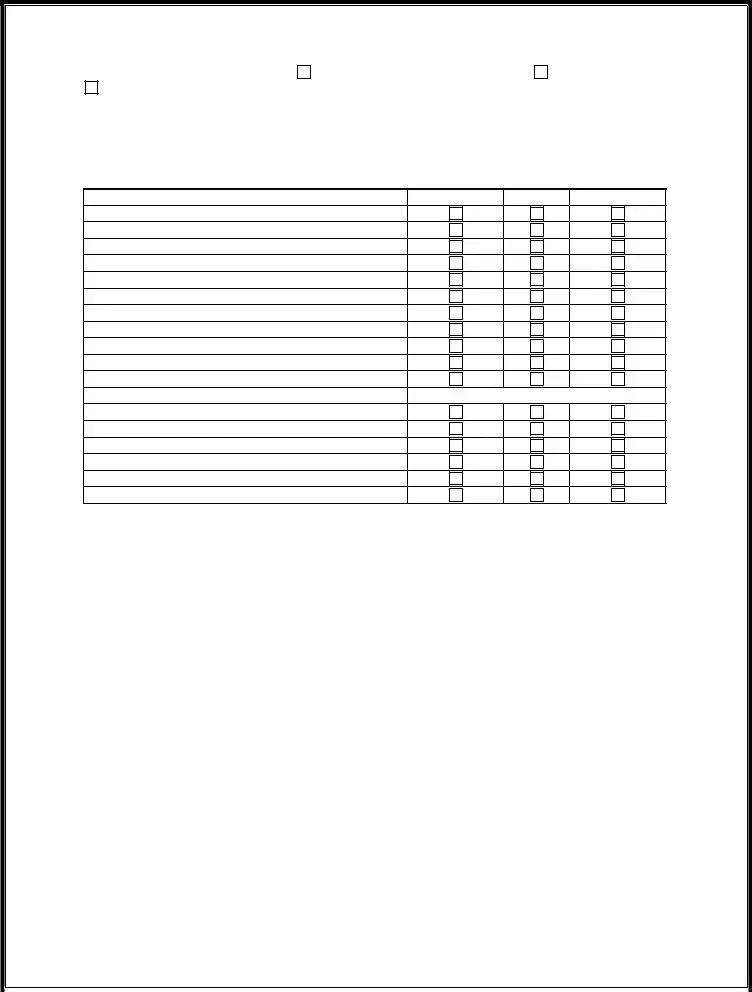
conveyed to Buyer, if more than one as |
Joint tenants with rights of survivorship, |
tenants in common, |
||
Other: |
|
|
Prior to closing the property shall remain |
|
in the possession of Seller and Seller shall deliver the property to Buyer in substantially the same condition at closing, as on the date of this contract, reasonable wear and tear excepted.
10.CLOSING COSTS AND EXPENSES: The following closing costs shall be paid as provided. (Leave blank if the closing cost does not apply.)
Closing Costs |
Buyer |
Seller |
Both* |
Attorney Fees
Title Insurance
Title Abstract or Certificate
Property Insurance
Recording Fees
Appraisal
Survey
Termite Inspection
Origination fees
Discount Points
If contingent on rezoning, cost and expenses of rezoning
Other:
All other closing costs
* 50/50 between buyer and seller.
11.PRORATIONS: Taxes for the current year, interest, maintenance fees, assessments, dues and rents, if any, will be prorated through the Closing Date. If taxes for the current year vary from the amount prorated at closing, the parties shall adjust the prorations when tax statements for the current year are available. If a loan is assumed and the lender maintains an escrow account, the escrow account must be transferred to Buyer without any deficiency. Buyer shall reimburse Seller for the amount in the transferred account. Buyer shall pay the premium for a new insurance policy. If taxes are not paid at or prior to closing, Buyer will be obligated to pay taxes for the current year.
12.CASUALTY LOSS: If any part of the Property is damaged or destroyed by fire or other casualty loss after the effective date of the contract, Seller shall restore the Property to its previous condition as soon as reasonably possible. If Seller fails to do so due to factors beyond Seller’s control, Buyer may either (a) terminate this contract and the earnest money will be refunded to Buyer, (b) extend the time for performance and the Closing Date will be extended as necessary, or (c) accept the Property in its damaged condition and accept an assignment of insurance proceeds.
13.DEFAULT: If Buyer fails to comply with this contract, Buyer will be in default, and Seller may either (a) seek such other relief as may be provided by law, or (b) terminate this contract and receive the earnest money as liquidated damages, thereby releasing both parties from this contract. If Seller fails to comply with this contract, Seller will be in default and Buyer may either (a) seek such other relief as may be provided by law, or (b) terminate this contract and receive the earnest money, thereby releasing both parties from this contract.
14.ATTORNEY'S FEES: The prevailing party in any legal proceeding brought under or with respect to the transaction described in this contract is entitled to recover from the
15.REPRESENTATIONS: Seller represents that as of the Closing Date (a) there will be no liens, assessments, or
Buyer Initials ______ _______ |
- 5 - |
Seller Initials _______ _______ |
|
|
|

security interests against the Property which will not be satisfied out of the sales proceeds unless securing payment of any loans assumed by Buyer and (b) assumed loans will not be in default. If any representation in this contract is untrue on the Closing Date, this contract may be terminated by Buyer and the earnest money will be refunded to Buyer. All representations contained in this contract will survive closing.
16.FEDERAL TAX REQUIREMENT: If Seller is a "foreign person", as defined by applicable law, or if Seller fails to deliver an affidavit that Seller is not a "foreign person", then Buyer shall withhold from the sales proceeds an amount sufficient to comply with applicable tax law and deliver the same to the Internal Revenue Service together with appropriate tax forms. IRS regulations require filing written reports if cash in excess of specified amounts is received in the transaction.
17.AGREEMENT OF PARTIES: This contract contains the entire agreement of the parties and cannot be changed except by their written agreement.
18.NOTICES: All notices from one party to the other must be in writing and are effective when mailed to, hand- delivered at, or transmitted by facsimile machine as follows:
To Buyer at: |
|
To Seller at: |
|
|
|
|
|
|
|
|
|
Telephone ( )
Facsimile ( )
Telephone ( )
Facsimile ( )
19.ASSIGNMENT: This agreement may not be assigned by Buyer without the consent of Seller. This agreement may be assigned by Seller and shall be binding on the heirs and assigns of the parties hereto.
20.PRIOR AGREEMENTS: This contract incorporates all prior agreements between the parties, contains the entire and final agreement of the parties, and cannot be changed except by their written consent. Neither party has relied upon any statement or representation made by the other party or any sales representative bringing the parties together. Neither party shall be bound by any terms, conditions, oral statements, warranties, or representations not herein contained. Each party acknowledges that he has read and understands this contract. The provisions of this contract shall apply to and bind the heirs, executors, administrators, successors and assigns of the respective parties hereto. When herein used, the singular includes the plural and the masculine includes the feminine as the context may require.
21.NO BROKER OR AGENTS: The parties represent that neither party has employed the services of a real estate broker or agent in connection with the property, or that if such agents have been employed, that the party employing said agent shall pay any and all expenses outside the closing of this agreement.
22.EMINENT DOMAIN: If the property is condemned by eminent domain after the effective date hereof, the Seller and Buyer shall agree to continue the closing, or a portion thereof, or cancel this Contract. If the parties cannot agree,
this contract shall |
remain valid with Buyer being entitled to any condemnation proceeds at or after closing, or |
be cancelled and the earnest money returned to Buyer.
Buyer Initials ______ _______ |
- 6 - |
Seller Initials _______ _______ |
|
|
|
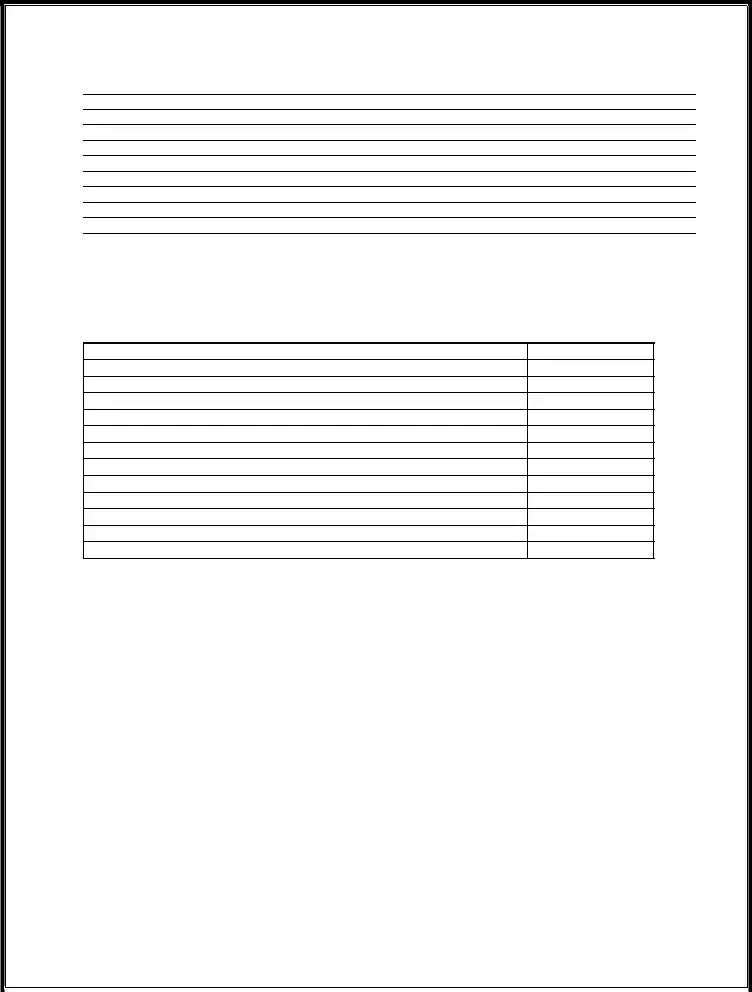
23.OTHER PROVISIONS
24.TIME IS OF THE ESSENCE IN THE PERFORMANCE OF THIS AGREEMENT.
25.GOVERNING LAW: This contract shall be governed by the laws of the State of New Jersey.
26.DEADLINE LIST (Optional) (complete all that apply). Based on other provisions of Contract.
Deadline |
Date |
Loan Application Deadline, if contingent on loan
Loan Commitment Deadline
Buyer(s) Credit Information to Seller
Disapproval of Buyers Credit Deadline
Survey Deadline
Title Objection Deadline
Survey Deadline
Appraisal Deadline
Property Inspection Deadline
Whether or not listed above, deadlines contained in this Contract may be extended informally by a writing signed by the person granting the extension except for the closing date which must be extended by a writing signed by both Seller and Buyer.
EXECUTED the |
|
day of |
|
, 20 |
|
(THE EFFECTIVE DATE). |
||
|
|
|
|
|
|
|
|
|
|
Buyer |
|
|
|
Seller |
|
||
|
|
|
|
|
|
|
|
|
|
Buyer |
|
|
|
Seller |
|
||
Buyer Initials ______ _______ |
- 7 - |
Seller Initials _______ _______ |
|
|
|

EXHIBIT FOR DESCRIPTION OR ATTACH SEPARATE DESCRIPTION
|
|
|
|
|
RECEIPT |
|
|
|
|
|
|
|||
Receipt of Earnest Money is acknowledged. |
|
|
|
|
|
|
||||||||
Signature: |
|
|
Date: |
, 20 |
|
|||||||||
By: |
|
|
|
|
|
|
|
|
|
|
|
|
|
|
|
|
|
|
|
Telephone ( |
) |
|
|
||||||
Address |
|
|
|
|
|
|
|
|
|
|
|
|
||
|
|
|
|
|
Facsimile ( |
) |
|
|
|
|
||||
City |
State |
Zip Code |
|
|
|
|
|
|
|
|
||||
Buyer Initials ______ _______ |
- 8 - |
Seller Initials _______ _______ |
|
|
|
Document Specifications
| Fact Name | Detail |
|---|---|
| Governing Laws and Acts | The contract is subject to the New Residential Construction Off-Site Conditions Disclosure Act, P.L.1995, C. 253, and Federal laws regarding lead-based paint disclosure for residential dwellings constructed prior to 1978. |
| Property and Inclusions | Includes a detailed list of items that are included in the sale, such as fixtures and appliances, unless specifically struck out or listed as not included in the contract. |
| Financing and Loans | Specifies the terms related to financing, including cash sale, owner financing, new loans, and the assumption of loans, along with conditions for approval of these financial arrangements. |
| Property Condition and Inspections | Outlines responsibilities regarding property inspections, the condition of the property, and any required disclosures, including the seller’s disclosure of lead-based paint hazards if applicable. |
| Closing, Costs, and Expenses | Details the responsibilities of the buyer and seller regarding closing costs and specifies which party is responsible for paying specific expenses associated with the closing. |
| Title and Conveyance | The seller is required to convey title to the buyer through a Warranty Deed or suitable alternative, ensuring the title is good and marketable, subject to specific conditions and exceptions listed within the contract. |
Detailed Steps for Using Nj Contract Sale
Filling out the NJ Contract Sale form is a critical step towards the sale and purchase of real estate in New Jersey, especially in transactions where no broker is involved. This document outlines the terms and conditions agreed upon by the seller and buyer. It is essential to meticulously complete the form to ensure that all parties have a clear understanding of the agreement. Here is a step-by-process to guide you through filling out the form.
- At the top of the form, write the names of the seller(s) and buyer(s) as they appear on the legal documents related to the property.
- Under the section titled "Agreement to Sale and Purchase," provide a detailed description of the property. This includes the address, lot, and block on the municipal tax map of the respective county in New Jersey. If there is a legal description or an attached exhibit describing the property, make sure to include or attach it here.
- In the list provided under the property description, strike through any items that the seller plans to retain. Leave unchanged any items that will be included in the sale.
- Fill in the "Sales Price" section by writing down the purchase price, earnest money, new loan amount, assumption of loan amount (if any), seller financing (if any), and the cash due at closing. Ensure that the totals in both columns are equal.
- Specify the type of financing under the "Financing" section – mark whether it's a cash sale, involves owner financing, a new loan, or an assumption of an existing loan. Fill in the relevant details such as the amount to be financed, interest rate, and terms. If applicable, mark the specifications for FHA/VA loans or detail the terms for an existing loan review.
- Indicate the earnest money amount to be deposited and with whom it will be deposited under the "Earnest Money" section.
- Review and complete the "Property Condition" section. This includes compliance with the New Residential Construction Off-Site Conditions Disclosure Act, disclosure requirements for lead-based paint, and agreements regarding the property's condition, inspections, and any required repairs.
- For the "Closing" section, write the agreed-upon closing date and note any circumstances under which the closing date may be extended.
- Under "Title and Conveyance," agree on how the seller will convey title and specify any conditions or exclusions to the marketable title.
- Determine who is responsible for the costs of appraisal, survey, and termite inspection. Mark the appropriate boxes and specify who pays for each.
- In the "Possession and Title" section, indicate how title will be conveyed and when possession of the property will be transferred to the buyer.
- Assign responsibilities for various closing costs and expenses in the corresponding section by indicating whether the buyer, seller, or both will pay each cost.
- Complete the "Prorations" section to outline how taxes, interest, maintenance fees, assessments, dues, and rents will be prorated at closing.
- Address how any casualty loss that occurs after the effective date of the contract but before closing will be handled in the "Casualty Loss" section.
- Read through the "Default" and "Attorney's Fees" sections to understand the remedies available in case of default by either party, and who will be responsible for attorney's fees in the event of a legal proceeding.
- Both the seller and the buyer should initial each page where indicated to acknowledge their agreement to the terms on each page.
Once the NJ Contract Sale form is fully completed and signed by both parties, the next steps typically involve fulfilling any remaining contractual obligations, such as securing financing, completing inspections, and addressing any repairs or conditions specified in the contract. Both parties should work closely with their respective attorneys and other professionals to ensure all conditions are met before the closing date. By following these instructions and carefully completing the form, sellers and buyers can help ensure a smooth transaction.
Learn More on Nj Contract Sale
What is a New Jersey Contract for Sale and Purchase of Real Estate (No Broker)?
This document is a legally binding agreement between a seller and a buyer in the absence of a real estate broker. It outlines terms and conditions related to the sale and purchase of property, including but not limited to, identification of the property, sales price, payment terms, property condition, closing costs, and possession details.
What does "no broker" mean in this context?
"No broker" indicates that the transaction is conducted without the involvement of a real estate broker or agent. The parties deal directly with each other, potentially saving on commission fees that are typically paid to brokers.
How is the purchase price determined and adjusted?
The purchase price is the amount agreed upon by both the seller and the buyer as stated in the contract. Adjustments to the cash payable at closing may occur if there's a variance in the unpaid principal balance(s) of any assumed loan(s) as of the Closing Date from the balances stated in the contract.
What financing options are available according to this contract?
The contract mentions several financing options, including:
- Cash Sale: The transaction is not contingent on financing.
- Owner Financing: The seller provides financing to the buyer under specified terms.
- New Loan or Loan Assumption: The contract is contingent upon the buyer securing financing or obtaining approval for assumption of an existing loan.
Is there a requirement for earnest money in this transaction?
Yes, the buyer is required to deposit a specified amount as earnest money upon execution of the contract by both parties. This amount is held in escrow and applied to the purchase price at closing, or refunded to the buyer under certain conditions if the contract is terminated.
The buyer has the right to inspect the property at their own expense. If the inspections reveal defects, the buyer may either cancel the contract and receive a refund of the earnest money, proceed with the closing, or renegotiate the contract if the seller agrees. Notices of any defects must be provided to the seller within a specified period after the contract's execution.
Who is responsible for closing costs?
The contract specifies which closing costs are to be paid by the buyer, seller, or shared between them. These can include attorney fees, title insurance, property insurance, recording fees, appraisals, surveys, termite inspections, and other applicable expenses.
How are property taxes and other prorated fees handled?
Taxes, interest, maintenance fees, assessments, dues, and rents, if applicable, will be prorated through the Closing Date. Variations in the prorated amounts based on actual tax statements for the current year will result in adjustments between the parties.
What happens if there is a casualty loss before closing?
If the property suffers damage or destruction due to a casualty event after the contract's effective date, the seller must restore the property to its previous condition as soon as reasonably possible. The buyer has the option to terminate the contract and receive a refund of the earnest money, extend the closing date, or accept the property in its damaged condition along with an assignment of insurance proceeds.
Common mistakes
Filling out the New Jersey Contract of Sale form involves a careful process, and inaccuracies can lead to significant complications. Below are mistakes often made while completing this vital document:
Incorrectly identifying the property: One of the most common mistakes is not providing a complete or accurate description of the property being sold. This includes failing to include the full address, incorrect lot and block number referencing, or neglecting to attach or accurately describe an exhibit when additional space is needed for the property description.
Omitting financial terms: It's crucial to detail all financial terms clearly, including the sales price, earnest money deposit, and terms related to assumed loans or seller financing. Misunderstandings or omissions in this section can cause disputes and derail the sale.
Misunderstanding financing contingencies: Buyers sometimes mistakenly assume that this clause automatically covers all financing issues. It's essential to specify the type of financing being sought (FHA, VA, conventional) and understand the conditions under which the contract can be terminated if financing isn't secured.
Skipping necessary inspections and ignoring “as-is” condition: Buyers may overlook or underestimate the importance of inspections and the implications of accepting a property “as-is.” Not scheduling inspections or misunderstanding the as-is provision can lead to unexpected responsibilities and costs post-sale.
Inaccurate allocation of closing costs and prorations: Failing to clearly allocate who (buyer or seller) is responsible for various closing costs, taxes, and other prorations can lead to last-minute confusion and potential conflict at closing.
Neglecting to specify possession and title conveyance arrangements: Not clearly defining when possession of the property will be transferred or misunderstanding joint tenancy can create legal and logistical issues. It's essential to agree on these terms and understand their implications fully.
Each section of the contract serves to protect and clarify the rights and obligations of both buyer and seller, making precise and thorough completion of the document paramount. Avoiding these common errors can help ensure a smoother transaction for all parties involved.
Documents used along the form
When navigating the process of a real estate sale, specifically in New Jersey, utilizing a Contract for the Sale and Purchase of Real Estate is just the first step. To ensure a smooth transaction, several other forms and documents often accompany this initial agreement. Each document plays a vital role in safeguarding the interests of all parties involved and ensuring compliance with state laws and regulations.
- Title Insurance Commitment: Offers a detailed examination of the property's title, revealing any liens or encumbrances that might impact the buyer's ownership.
- Property Disclosure Statement: Required by law, this form, completed by the seller, discloses the condition of the property, including any known defects or problems.
- Lead-Based Paint Disclosure: For homes built before 1978, this federal requirement informs buyers about the potential presence of lead-based paint and its hazards.
- Home Inspection Report: A document prepared by a professional inspector, detailing the condition of the property, including structural, electrical, and plumbing systems.
- Appraisal Report: Provides an expert assessment of the property's market value, often required by lenders to ensure the loan amount does not exceed the property's worth.
- Mortgage Pre-Approval Letter: This document from the buyer's lender confirms the buyer's ability to secure financing up to a specific amount, strengthening their offer.
- Closing Disclosure (CD): A detailed outline of financial transactions, including the sales price, loan amount, and closing costs, provided to buyers and sellers before closing.
- Deed: The legal document that transfers ownership of real estate from the seller to the buyer, executed at closing.
- Flood Zone Statement: Indicates whether the property is located in a flood hazard area, which affects insurance requirements and costs.
- Home Warranty Agreement: An optional but recommended contract that provides for the repair or replacement of the home's major systems and appliances.
Each document serves a specific purpose, contributing to a comprehensive understanding and agreement between the parties involved in a real estate transaction. It is advisable for both buyers and sellers to familiarize themselves with these documents, and seek guidance from real estate professionals, to ensure a secure and legally sound transaction. Understanding and properly executing these documents can greatly reduce potential risks and complications, making the process of buying or selling property in New Jersey more efficient and reassuring for all parties involved.
Similar forms
The Residential Real Estate Purchase Agreement closely mirrors the NJ Contract Sale form, as both are employed in the transaction of purchasing a home without the involvement of a real estate broker. These agreements serve as the foundational document outlining the terms of the sale, including the agreed-upon price, property description, and conditions of sale such as financing and inspections. Both documents ensure that the obligations of each party are clearly defined to facilitate a smooth transfer of property.
A similar document is the Bill of Sale, which, like the NJ Contract Sale form, is used to transfer ownership of personal property from the seller to the buyer. While the NJ Contract Sale form specifically deals with real estate transactions, a Bill of Sale is often used for personal properties such as vehicles or equipment. Both documents typically include a description of the property being sold, the sale price, and the signatures of both parties to confirm their agreement to the terms of the sale.
The Lease Agreement shares similarities with the NJ Contract Sale form in terms of specifying conditions related to a property, albeit for leasing rather than selling. Both documents outline specific terms and conditions regarding the use of the property, responsibilities of the parties involved, and duration of agreement. However, the key difference lies in their purpose: while the NJ Contract Sale form is for buying and selling property, the Lease Agreement is for renting or leasing property.
A Financing Agreement is another document similar to the NJ Contract Sale form in that it may include terms of financing within the agreement. Both documents can contain clauses related to the financing of the property, outlining the responsibilities of the buyer to secure a loan or mortgage under specified conditions. This similarity is crucial in transactions where the buyer does not pay the full purchase price up front and instead relies on obtaining a loan.
The Warranty Deed is often a follow-up to the NJ Contract Sale form, serving to legally transfer property ownership from the seller to the buyer. Though the Warranty Deed is a separate legal document, it is directly related to the sale and purchase agreement, ensuring that the seller has the right to sell the property and that it is transferred free of liens or other encumbrances, except as otherwise noted in the sale agreement.
An Earnest Money Agreement is typically incorporated within or accompanies the NJ Contract Sale form. This agreement signifies the buyer's good faith and intention to proceed with the real estate transaction by providing a deposit. The Earnest Money Agreement lays out terms for holding, releasing, or forfeiting this deposit, directly impacting the sales agreement based on the fulfillment or breach of its terms.
Title Insurance Applications, while not a part of the NJ Contract Sale form, are inherently connected to the real estate transaction process it initiates. Pursuing title insurance requires a clear understanding of the property’s ownership history, any liens or encumbrances on it, and ensuring the buyer’s protection against future disputes - aspects that are rooted in the details of the sale agreement.
The Property Disclosure Statement, though distinct, complements the NJ Contract Sale form by providing detailed information about the condition of the property being sold. Sellers are often required to disclose any known issues or defects that could affect the property's value, thereby informing the buyer's decision and potentially impacting the sale terms.
The Amendment to Purchase and Sale Agreement, while technically a modification document, parallels the NJ and Contract Sale form in its purpose to alter or clarify terms initially agreed upon. Such amendments may be necessary if new information arises or if both parties mutually decide to adjust the terms of the sale, maintaining the integrity of the original agreement while allowing for necessary flexibility.
Dos and Don'ts
Filling out the NJ Contract of Sale form can seem daunting, but with a clear set of dos and don'ts, the process can be smoothened. Below are some tips to keep in mind when dealing with this important document:
What You Should Do:- Read thoroughly: Before filling anything out, read the entire document carefully to understand all the requirements and stipulations.
- Fill out completely: Ensure all required fields are filled out accurately. Incomplete forms can lead to unnecessary delays or complications.
- Consult with a professional: Considering consulting with a legal advisor or real estate professional if any part of the contract is unclear. This can prevent potential issues in the future.
- Review the property description: Pay special attention to the property description section and make sure it matches the actual property details, including the legal description.
- Keep copies: Always keep a copy of the signed contract for your records. This will be crucial if any disputes arise or for future reference.
- Rush through the process: Taking your time to fill out the form carefully can prevent mistakes that might be difficult to correct later on.
- Leave blanks: If a section does not apply, clearly mark it as "N/A" instead of leaving it blank. This clarifies that the question was not overlooked.
- Assume anything: If certain terms or conditions are agreed upon verbally, make sure they are also included in the contract. Verbal agreements are not enforceable in the context of a real estate sale.
- Ignore financing terms: Thoroughly review the financing section, especially if the sale is contingent upon obtaining a mortgage. Clear understanding of these terms is essential for both parties.
- Sign without understanding: Never sign the contract if there are any doubts or unresolved questions. It's crucial that both parties fully understand the agreement they are entering into.
By following these guidelines, both buyers and sellers can ensure a smoother and more secure transaction process when dealing with the NJ Contract of Sale form.
Misconceptions
Understanding the New Jersey Contract of Sale form can seem daunting for many. There are numerous misconceptions that can confuse both buyers and sellers. Below are ten common misunderstandings, clarified for better comprehension.
Misconception 1: The presence of a broker is necessary for the sale and purchase of real estate. While brokers can facilitate the process, this contract specifically outlines a transaction without the involvement of a broker, showing that private sales are permissible under New Jersey law.
Misconception 2: The “Property” only includes the land and physical structures. In reality, the definition of "Property" also encompasses a variety of removable items and fixtures, unless explicitly excluded in the contract. This can include curtains, appliances, and even built-in units.
Misconception 3: The sales price is fixed and non-negotiable. The sales price listed in the contract is indeed subject to negotiation before the agreement is finalized. Any changes must be reflected in the contract and agreed upon by both parties.
Misconception 4: Financing details are optional in the contract. If financing is part of the transaction, specific details regarding the type and terms must be documented in the contract, underscoring the importance of financial planning and approval in the process.
Misconception 5: The earnest money deposit is optional. Earnest money is a critical component of the contract, serving as a buyer's demonstration of good faith. The contract outlines the requirement for an earnest money deposit upon execution.
Misconception 6: Property inspections are always mandatory. While highly recommended, the contract allows buyers the option to waive inspections. However, for properties built before 1978, federal law requires a lead-based paint inspection or risk assessment unless waived by the buyer.
Misconception 7: Sellers are not required to disclose information about the property's condition. The contract mandates that sellers disclose known material defects about the property’s condition, ensuring that buyers are informed about aspects that might influence their decision to purchase.
Misconception 8: Closing costs are solely the buyer's responsibility. The contract specifies which closing costs are borne by the buyer, the seller, or shared between both, highlighting that negotiations can influence the distribution of these expenses.
Misconception 9: The seller can back out of the sale for any reason without consequence. If a seller fails to fulfill their obligations under the contract, they can be considered in default, potentially facing legal consequences or financial penalties.
Misconception 10: Verbal agreements are as binding as the written contract. The contract emphasizes the importance of documenting all terms and agreements in writing. Verbal agreements or understandings not captured in the contract may not be legally enforceable.
Clarifying these misconceptions is crucial for both parties to fully understand their rights and obligations within the New Jersey Contract of Sale. By dispelling these common misunderstandings, buyers and sellers can navigate the process more effectively, ensuring a smooth and transparent transaction.
Key takeaways
Understanding the details of the NJ Contract Sale form is crucial for a smooth real estate transaction. Here are some key takeaways:
- The contract establishes a legal agreement between the seller and buyer for the purchase and sale of real estate, highlighting the commitment of both parties to proceed under the terms outlined.
- It includes a description of the property to be sold, ensuring that there is a clear understanding of the real estate involved. This includes the address and any items that will remain or be excluded from the sale.
- The sales price section outlines the total purchase amount and breaks down the payment method, including earnest money, new loans, seller financing, and any cash due at closing. This clarity ensures both parties are aware of the financial obligations.
- Financing terms are specified to address whether the purchase is contingent on the buyer obtaining a loan or if the seller is offering financing. Conditions for financing approval and the consequences of not meeting these conditions are also detailed.
- Property condition is an important aspect, with stipulations for inspections and the responsibility of repairs outlined. This section emphasizes the as-is condition of the property while allowing for inspections to protect the buyer's interest.
- The closing details provide a timeline and define the responsibilities of each party to ensure a clear path to transferring ownership, including handling of closing costs and adjustments for property-related expenses.
Understanding these components is vital for both buyers and sellers to navigate the complexities of real estate transactions with confidence and clarity. The NJ Contract Sale form serves as a comprehensive guide to ensure a fair and transparent process for the transfer of property.
Popular PDF Documents
Nj 2440 - See how NJ-2440 form documentation supports your exclusion claim for certain insurance benefits at tax time.
New Jersey Ppt 6 B - For questions or assistance regarding the PPT-6 B form, the Division of Taxation offers support through the Excise Tax Branch.
Certified Payroll Forms Nj - Serves as a critical legal document in the enforcement of equal pay acts and prevailing wage laws on government-funded construction sites in New Jersey.